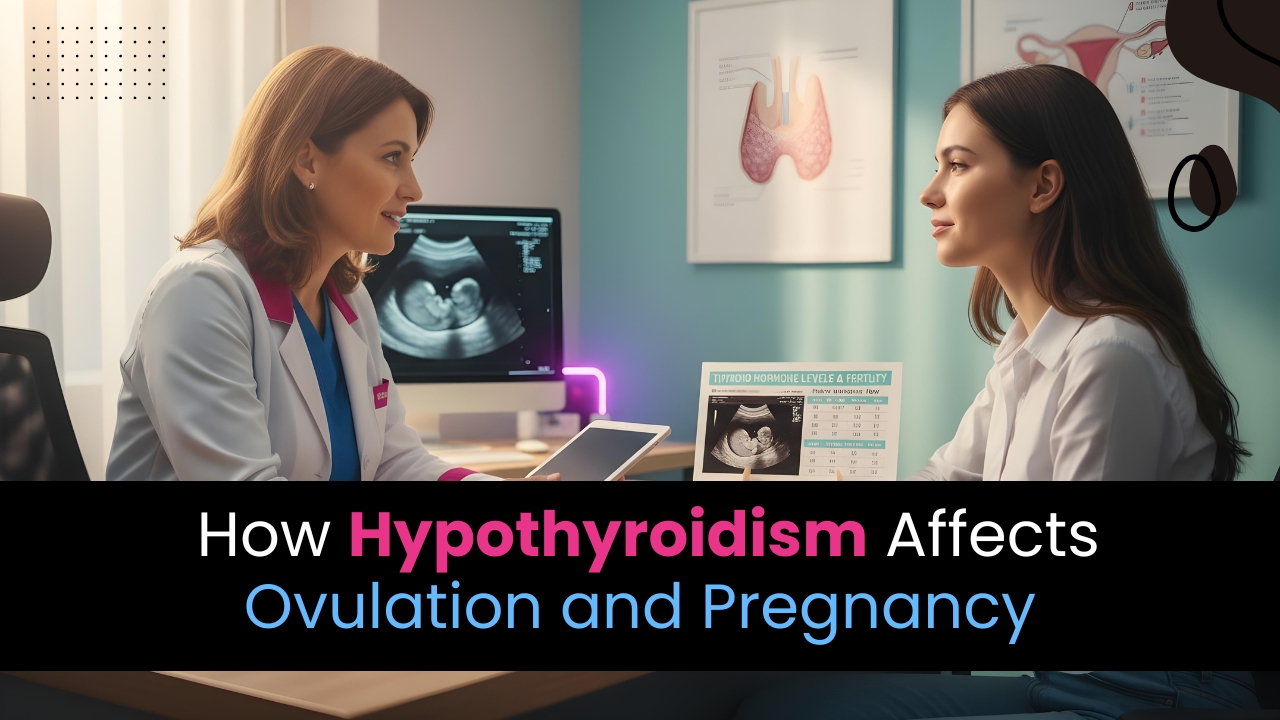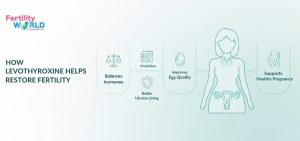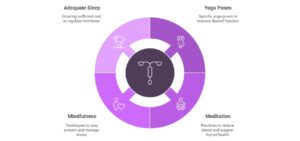This blog explains how an underactive thyroid (hypothyroidism) can quietly affect your hormones, ovulation, periods, egg quality, and chances of getting pregnant. It clearly shows how TSH, T3, and T4 levels influence your menstrual cycle, implantation, and early pregnancy — and why even a small imbalance can matter. You’ll also find how medicines like Levothyroxine, a thyroid-friendly diet, lifestyle changes, and regular testing can restore balance and support a healthy pregnancy. Overall, it’s a hopeful guide to understanding your thyroid better so you can protect your fertility with confidence and calm.
Connect with Fertility World Specialists Today — Get a Free Thyroid & Fertility Consultation
+91 9311850412 | Email- info@fertilityworld.in
Introduction
Your thyroid may be small, but it plays a big role in your journey to motherhood. When the thyroid gland slows down – a condition known as hypothyroidism it can silently affect your hormones, menstrual cycle and even your chances of becoming a mother. Many women don’t know that symptoms like irregular periods, fatigue, weight loss or weight gain or difficulty getting pregnant may actually be linked to thyroid disease.
The thyroid controls the release of T3 and T4 hormones, which help your body regulate metabolism, energy and reproductive function. When these hormones are low, the ovaries may not release eggs most often, and the uterus may not be fully prepared for implantation, leading to challenges in conceiving or maintaining a healthy pregnancy.
But here’s the hopeful part – hypothyroidism and fertility are thoroughly managed. With the correct diagnosis, medication and care, most women restore their hormonal balance and go on to have healthy pregnancies.
At Fertility World ,understanding your thyroid is the first step to taking control of your reproductive health. This guide will help you uncover how hypothyroidism affects ovulation, egg quality, and early pregnancy and how simple lifestyle and medical involvement can bring your fertility back into balance.
What Is Hypothyroidism and How It Affects Fertility
Hypothyroidism happens when the thyroid gland, which is a small, butterfly-shaped gland in your neck, doesn’t make enough thyroid hormones (T3 and T4). These hormones control metabolism, energy, body temperature, and menstrual periods. Almost every system in the body slows down when it drops below normal levels. This includes the reproductive system.
The connection between thyroid disorders and fertility is quite strong in women. The thyroid, ovaries, and pituitary gland all work together to control ovulation and the menstrual cycle. If thyroid hormone levels are too low, the brain could cease delivering signals for ovulation, which can cause periods to be late or missed. If you don’t treat hypothyroidism and reproductive problems, they can make it hard to get pregnant over time.
According to our Fertility World physicians, even a slight thyroid imbalance can affect hormone function. A healthy pregnancy is more likely when ovulation is regulated and egg quality is improved when it is fixed early.
How Does Hypothyroidism Affect Ovulation and the Menstrual Cycle
A sensitive hormonal route, including the pituitary gland, connects the thyroid and ovaries. Inconsistent ovulation results from disrupting this relationship
If you’ve ever wondered how hypothyroidism impacts ovulation, picture the pituitary gland attempting to transmit a signal for the release of eggs, but the thyroid refusing to cooperate. When thyroid-stimulating hormone (TSH) levels continue to rise, ovulation may halt or become irregular.
Women who suffer from ovulation issues and hypothyroidism may:
- Shorter or longer cycles
- Anovulation, or missed ovulation
- Postponed the release of the egg
- Unpredictable bleeding or spotting
When ovulation isn't regular, it's harder to predict when the fertile window will be, which makes getting pregnant more stressful.
Can You Still Ovulate with Hypothyroidism or High TSH Levels
Many women ask, ” Can I still ovulate with high TSH ?”
The answer is YES in mild or subclinical hypothyroidism; ovulation may still occur, but it is often unstable. The quality of the ovulated egg can also be affected.
Common patterns include:
- Cycles that last more than 35 days or ovulation that happens later
- Cycles without ovulation (no egg release)
- Days when it might be possible to get pregnant
Once medication restores thyroid hormone levels to normal, ovulation usually returns to normal within a few months. This is why it’s important to regularly monitor your TSH and ovulation patterns when you’re trying to get pregnant.
Does Hypothyroidism Affect Menstrual Regularity
Yes, hypothyroidism can mess up your periods by messing with how estrogen is broken down and the lining of the uterus. Some women have very heavy or painful periods, while others have very mild flow or sometimes no periods at all.
Some common changes that happen throughout a period are:
- Heavy or long-lasting bleeding (menorrhagia)
- Cycles that are short or don’t happen too often
- Seeing blood between menstruation
- Missed periods for months (amenorrhea)
When thyroid dysfunction is treated, most women see their periods return to a predictable rhythm, which also improves chances of pregnancy.
How Hypothyroidism Affects Egg Quality and Fertilization
Thyroid hormones provide healthy eggs with the energy they need. Low T3 and T4 levels weaken the egg’s mitochondria (the cell’s powerhouses), making it harder for the egg to grow correctly.
Hypothyroidism can make eggs of poor quality, which can lead to failed fertilisation, early miscarriage, or chromosomal abnormalities in embryos. High levels of TSH or thyroid antibodies (anti-TPO and anti-TG) can also hurt the egg’s outer membrane, which makes it harder for sperm to fertilise it.
| Hormone | Effect on Egg Quality | Fertility Impact |
|---|---|---|
| Low T3 & T4 | Weak mitochondrial energy | Poor egg maturation |
| High TSH | Slower follicle rupture | Fewer ovulated eggs |
| Thyroid Antibodies | Affects oocyte membrane | Reduced fertilization success |
Taking care of your thyroid also helps your ovaries work better. Many women experience stronger ovulation and a higher chance of fertilisation when they take the right medicine and eat the right foods.
Does Hypothyroidism Affect Implantation and Early Pregnancy
Thyroid hormones are still essential after conception. Low levels can make it harder for the embryo to attach by cutting off blood flow to the uterus and making the lining overly thin. A TSH level exceeding 4.5 mIU/L makes it more likely that the embryo won’t implant properly or that the pregnancy will end early.
Women with thyroid antibodies may have difficulty, as these antibodies may disrupt embryo development despite normal TSH levels.
Autoimmune Hypothyroidism (Hashimoto’s) and Implantation Issues
In Hashimoto’s thyroiditis, the immune system mistakenly targets the thyroid gland. These thyroid antibodies disrupt hormone balance, making the uterus less receptive to an embryo.
This could cause:
- Uterine lining that is thin or not well-formed
- Early miscarriage or failure of implantation
- Need for early thyroid medication while pregnant.
Regular tests for anti-TPO and anti-TG antibodies can help find Hashimoto’s disease early. Most women have healthy pregnancies when they receive the proper care.
What Is a Normal TSH Level for Fertility and Pregnancy
One of the most crucial steps before getting pregnant is to keep your TSH level in check. For optimal ovulation and implantation, TSH levels should be between 1.0 and 2.5 mIU/L.
| Stage | Ideal TSH Range (mIU/L) | Why It Matters |
|---|---|---|
| Pre-Conception | 1.0 – 2.5 | Best range for ovulation and implantation |
| 1st Trimester | 0.5 – 2.5 | Supports fetal brain and organ development |
| 2nd–3rd Trimester | 0.3 – 3.0 | Maintains hormonal stability in pregnancy |
If left untreated, a TSH level higher than 4.0 mIU/L could cause irregular ovulation or a higher chance of miscarriage. To keep these levels consistent, doctors often change the drug during pregnancy.
Which Thyroid Hormones Affect Fertility Most
T3 (Triiodothyronine) and T4 (Thyroxine) are the thyroid hormones that have the most direct effect on reproductive health. They help follicles expand, start ovulation, and assist the lining of the uterus to grow. TSH controls how much of these hormones are made.
Keeping T3, T4, and TSH in balance ensures that ovulation goes smoothly, that eggs are stronger, and that the uterus is ready for implantation. This hormones are produced by the thyroid gland and help in:
- Follicle maturation: helps the ovaries grow eggs appropriately.
- Regulating ovulation: making sure that eggs are released on schedule each month.
- Developing the uterine lining: making the endometrium thicker so that an embryo can implant properly
TSH, or Thyroid-Stimulating Hormone, is the “manager” that controls how much T3 and T4 your thyroid makes. If your TSH levels are too high, it suggests your thyroid isn’t working properly (hypothyroidism), and your ovaries may not respond well to signals that it’s time to ovulate.
An imbalance in these hormones can cause a chain reaction:
- Low-quality eggs and late ovulation
- Thin or poorly prepared uterine lining
- Less likely for the embryo to implant
Tip from Fertility World: A simple thyroid test before planning pregnancy can save months of uncertainty. Keeping your thyroid healthy is one of the smallest — yet most powerful — steps toward a healthy conception and peaceful pregnancy.
Can You Get Pregnant with Hypothyroidism
Yes, you can get pregnant even if you have hypothyroidism, especially if you take care of your thyroid correctly. After their TSH levels are brought into equilibrium with medication and regular checkups, many women get pregnant on their own.
Low levels of hormones (T3 and T4) may slow or halt ovulation. But once hormone levels return to normal, the ovaries usually resume regular functioning. Even women with mild thyroid problems can typically get pregnant again within a few months of starting treatment.
At Fertility World, we see many hopeful mothers conceive naturally after balancing their thyroid health and menstrual cycles.
| Condition | Chance of Natural Conception | With Levothyroxine Treatment |
|---|---|---|
| Subclinical Hypothyroidism | 70–80% | 90–95% |
| Mild Hypothyroidism | 50–70% | 85% |
| Severe Hypothyroidism | <30% | 60–70% |
With consistent treatment, ovulation and menstrual regularity usually return within 2–3 months, and your fertility journey becomes much smoother.
How Levothyroxine Helps Restore Fertility
Levothyroxine is a synthetic form of the natural T4 (Thyroxine) hormone that is used to treat hypothyroidism. It works by giving your body the hormone your thyroid can’t make enough of, restoring its normal hormonal rhythm. Your reproductive system will start working better again once your TSH (Thyroid-Stimulating Hormone) levels are back in equilibrium
- Balances hormones: Keeps TSH, T3, and T4 levels stable, which helps with conception.
- Regulates ovulation: Helps your body release eggs each month.
- Makes eggs better: Gives them the power and energy they need to mature
- Builds the uterine lining by thickening it and preparing it for implantation.
- Helps with pregnancy: lowers the risk of miscarriage and helps the baby’s brain grow early on.
Doctors say that you should take Levothyroxine every morning on an empty stomach, at least 30 to 60 minutes before you eat. Taking your medicine as directed and having your thyroid checked every 6 to 8 weeks can significantly improve your parenting journey.
Many women experience greater energy, more regular periods, and better ovulation patterns within 2–3 months. When thyroid hormones are in balance, fertility naturally gets better, and both the mother and the baby have healthier pregnancies.
Common Pregnancy Complications Caused by Hypothyroidism
If hypothyroidism during pregnancy is not treated, it can lead to many issues, including:
- Miscarriage or early labour
- Gestational hypertension or pre-eclampsia
- Low birth weight or being born too soon
- The baby’s brain may not develop as quickly, or the baby may have a low IQ
Fortunately, these risks can be reduced by regularly checking TSH levels, adjusting medications, and maintaining a healthy diet. Most women who keep their thyroid levels in check have healthy infants and uncomplicated pregnancies.
How to Maintain a Healthy Pregnancy with Hypothyroidism
If you take care of your thyroid, eat well, and live a healthy lifestyle, pregnancy with hypothyroidism can be entirely healthy. The idea is to keep your TSH, T3, and T4 hormones in the right range so that your kid can get all the nutrition and oxygen it needs to grow correctly.
Our experts at Fertility World often tell pregnant women that small daily habits, like eating well and monitoring their thyroid, can have a significant impact on maintaining a stable pregnancy.
Hypothyroidism Diet Plan for Pregnancy
| Foods to Eat | Why It Helps | Foods to Avoid | Why to Avoid |
|---|---|---|---|
| Iodized salt, eggs, dairy | Provide iodine and nutrients that boost thyroid hormone production | Raw cabbage, soy, broccoli | Contain goitrogens that can slow thyroid activity |
| Fish, nuts, seeds | Supply selenium and omega-3 fatty acids that support hormone balance | Fried or processed foods | Hinder proper absorption of thyroid medicine |
| Fruits & whole grains | Improve digestion, metabolism, and sustained energy | Gluten (if sensitive) | May cause inflammation or digestive discomfort |
TIP: Take your thyroid medicine with normal water every morning at least an hour before breakfast. This increases uptake and keeps hormone levels steady all day.
Additional Guidance from Fertility World :
- Drinking a lot of water and eat fruits to get natural antioxidants.
- Don’t skip meals. Long gaps can mess with your blood sugar and thyroid rhythm.
- To help your baby grow, make sure to give them small amounts of protein at every meal. Good sources of protein are paneer, lentils, and eggs.
- Check your thyroid levels every 3 months to see if you need to adjust your dose.
You can be sure that both your thyroid and your pregnancy are healthy if you eat the correct meals and take your medications as directed.
Yoga and Lifestyle Support for Thyroid Health
Along with food and medicine, moving around every day can help regulate hormones naturally. Yoga movements like Sarvangasana (Shoulder Stand), Halasana (Plough Pose), and Matsyasana (Fish Pose) help blood flow to the thyroid gland.
Meditation, mindfulness, and getting adequate sleep can also help lower stress chemicals that can make hypothyroidism and pregnancy-related exhaustion worse.
Link Between PCOS and Thyroid Disorders in Fertility
Thyroid problems and PCOS often happen at the same time. Both create problems with hormones, weight gain, insulin resistance, and ovulation that isn’t regular.
When PCOS and hypothyroidism are both present, it might be even harder to get pregnant. Balancing thyroid hormones can help regulate menstrual cycles, reduce the risk of cyst formation, and improve egg quality. A thyroid function test should always be part of a woman’s reproductive screening if she has PCOS.
Final Thoughts — Restoring Thyroid Balance to Improve Fertility
Hypothyroidism doesn’t have to stop you from becoming a mother. With proper treatment and care, you can balance your thyroid levels is to improve your chances of being pregnant naturally.At Fertility World, we support you with:
- Thyroid hormone testing
- Personalised diet plans
- Complete wellness guidance
With the proper care, your body can find balance — and you can achieve your dream of having a baby.
Book your “Thyroid & Fertility Consultation” today at Fertility World.
Can you still get pregnant with hypothyroidism?
Yes. With proper treatment and controlled TSH levels, many women with hypothyroidism conceive naturally and have healthy pregnancies.
Does hypothyroidism affect implantation?
Yes, thyroid antibodies or low T3 and T4 levels can make the lining of the uterus thin and less open to egg implantation. Improving the balance of the thyroid makes implantation more likely to work.
Can hypothyroidism cause miscarriage?
If hypothyroidism is not treated or controlled, the chance of having an early miscarriage goes up. Regularly taking medicine and checking your thyroid level greatly lower this risk.
What foods should I eat for thyroid balance?
To help your thyroid make hormones, eat iodized salt, eggs, fish, nuts, and whole grains. But stay away from raw cabbage, soy, and fried foods because they stop your body from absorbing it.




